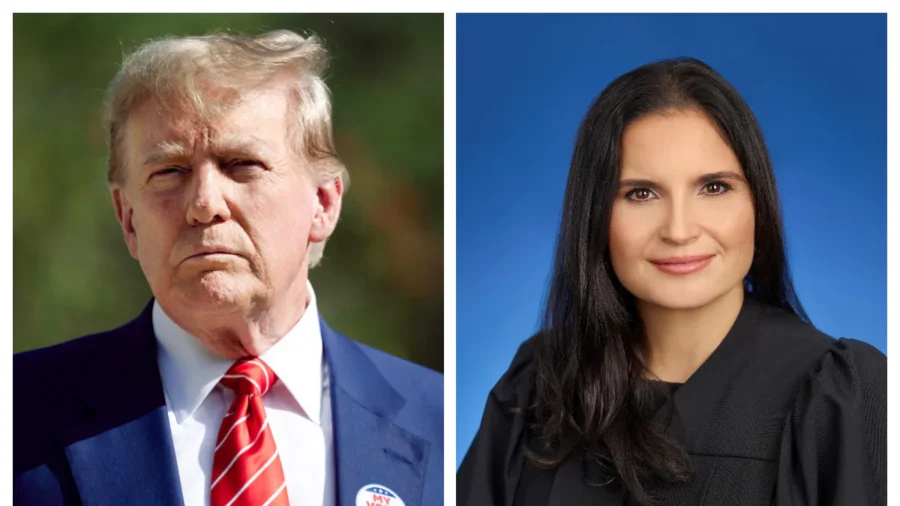The federal judge overseeing one of the criminal cases against former President Donald Trump on June 10 rejected the former president’s bid to throw out some charges against him, although she ordered one paragraph struck from the superseding indictment in the case.
Along with his codefendants, former President Trump argued that the superseding indictment, which brought the obstruction charges he is facing, failed to state an offense and should be dismissed.
Special counsel Jack Smith and his team disagreed, asserting that the charging document was “more than sufficient” under the law.
U.S. District Judge Aileen Cannon, the judge overseeing the case in a Florida federal court, sided mostly with the government.
Judge Cannon said there were issues with the indictment but that the issues did not rise to the level of dismissing the additional charges.
“The identified deficiencies, even if generating some arguable confusion, are either permitted by law, raise evidentiary challenges not appropriate for disposition at this juncture, and/or do not require dismissal even if technically deficient, so long as the jury is instructed appropriately and presented with adequate verdict forms as to each defendants’ alleged conduct,” the judge, appointed under President Trump, wrote in a 14-page order handed down on Monday night.
In portions of the indictment, according to former President Trump and codefendant Walt Nauta, the special counsel had wrongly charged the defendants with multiple offenses within a single count.
Count 34, for instance, charged former President Trump and Mr. Nauta with violating a law that prohibits acting with the intent to cause or induce a person to withhold testimony or documents from an official proceeding. The superseding indictment says that former President Trump “attempted to persuade Trump attorney 1 to hide and conceal documents from a federal grand jury; and Trump and Nauta misled Trump attorney 1 by moving boxes with classification markings so that Trump attorney 1 would not find the documents and produce them to a federal grand jury.”
The count’s “duplicity and misjoinder represents a core violation of Fed. R. Crim. P. 8, with maximum prejudice to the defendants through the blurring of defendants and charges in one count,” the defendants’ motion stated.
Judge Cannon ruled against the defendants’s argument, saying that the counts were not charging them for two or more separate offenses.
“Although the specific pleading format employed in counts 34 and 36 appears somewhat unconventional and is susceptible to some confusion, the court is ultimately satisfied that neither count requires dismissal on grounds of duplicity,” she wrote.
“Neither count charges more than one crime—although given the pleading format, there likely will be a need for clear prompts (and separate verdict forms) requiring the jury to determine unanimously which means, if any, each of the two defendants charged in counts 34 and 36 used to commit the alleged crimes,” she added later.
With regards to arguments against some other counts, Judge Cannon said that the arguments should be decided by a jury and do not warrant dismissal at this time.
Paragraph Struck
The defendants then asked, if the charges were not thrown out, that the court strike a number of portions of the indictment. They said the special counsel included “abundant surplusage of prejudicial, immaterial allegations.”
Mr. Smith said that the indictment only contained information “relevant to the charges,” and that none of the information was “inflammatory.”
Judge Cannon said she reviewed the indictment and concluded the government published a “speaking indictment,” or an indictment that includes “various nonessential allegations more akin to a narrative about the government’s theory of prosecution.”
She added later that much of the language was “legally unnecessary to serve the function of an indictment” but that she would, with one exception, not strike any of the allegations “because Defendants have not clearly shown that the challenged allegations are flatly irrelevant or prejudicial.”
The single exception is a paragraph that describes how former President Trump allegedly commented on an ongoing military operation in another country, and showed a classified map of that country, while meeting with a representative of his political action committee at his golf course in New Jersey in 2021.
Mr. Smith’s team indicated in a recent hearing that a decision was made to include that paragraph due to federal rules that let prosecutors inform jurors about acts carried out by defendants even if the acts don’t support any particular charges that are brought.
“This is not appropriate,” Judge Cannon said. “The Federal Rules of Criminal Procedure contemplate a specific procedure governing attempts to introduce evidence of other crimes, wrongs, or acts.”
She ordered that paragraph struck from the indictment.
Judge Cannon could, at a later time, strike more from the document. In a footnote, she said that she would not rule for now on a challenge from defendants relating to information purportedly from former President Trump’s attorneys because that matter is the subject of a pending motion.
From The Epoch Times

